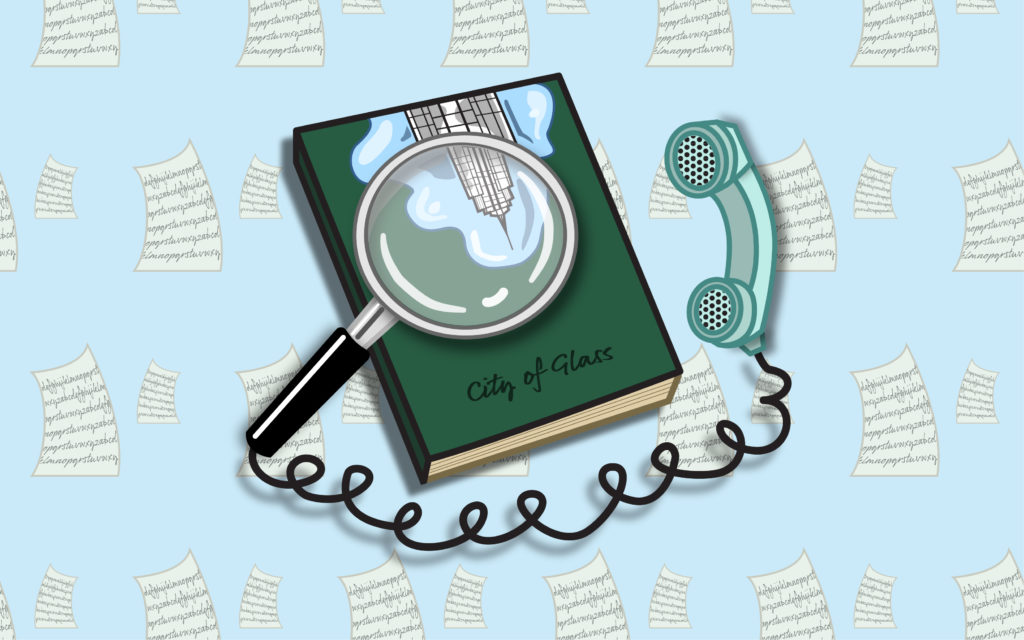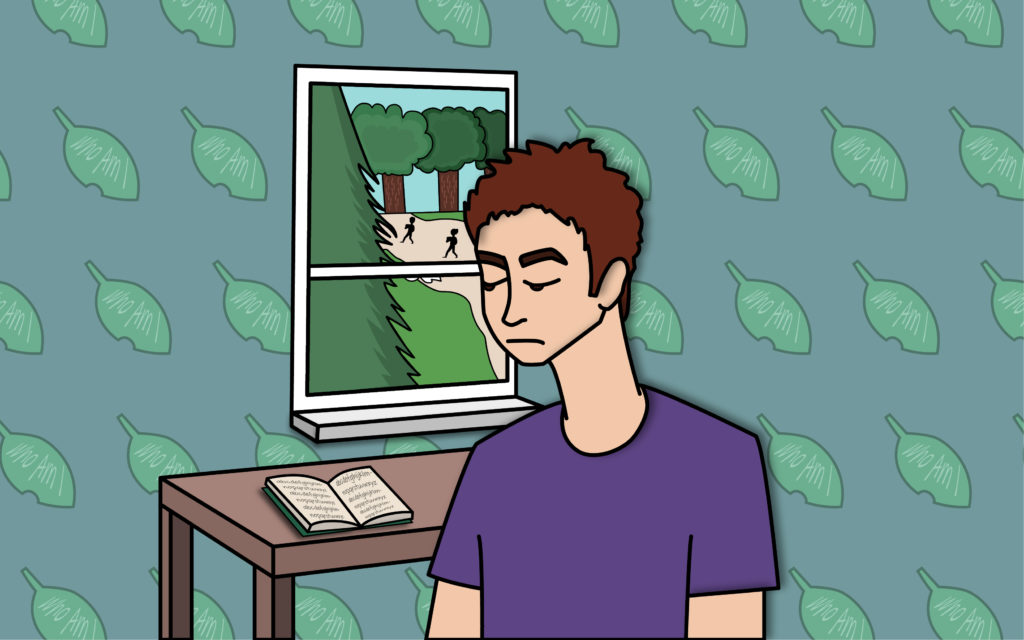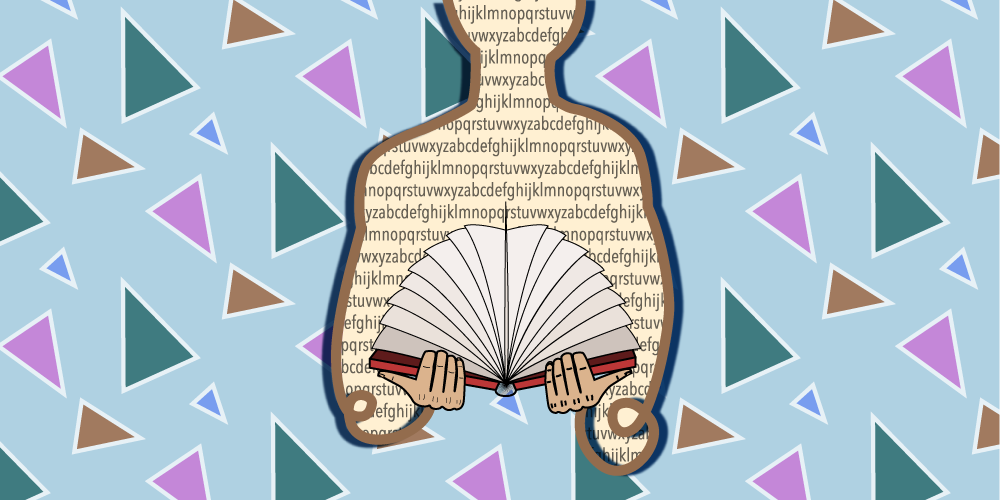I discovered Paul Auster’s City of Glass through an odd, never-to-be-repeated experience. While home for spring break in college, I learned the local armory was hosting Free Book Day. There, I encountered an auditorium filled with remaindered copies, front covers slashed in half. Stacks of the same hundred or more books filled long banquet tables. I chose Balzacs and Coetzees and Marshall Berman’s All That Is Solid Melts into Air, but City of Glass was the true discovery. The back of the Penguin paperback referred to it as a metaphysical detective story. As a philosophy minor who had devoured mysteries as a teen, it looked like the perfect choice.
Even so, I didn’t read it immediately. I was a myopically-focused sophomore who studied syllabi and course schedules more avidly than most of my classmates did reading assignments. I annotated required and suggested texts, going so far as to spend Reading Day actually reading, not sunbathing at the Indiana Dunes. As a Resident Advisor, I had to remain in my dorm through Senior Week, post-exams, and the more days that passed, the harder I found it to manufacture ways to pass the time. I packed my room, filling the checkered floor space with boxes of clothes, course notes, and stereo equipment. I cataloged damages in the other rooms on my floor. I walked for miles through the neighborhoods surrounding campus. Finally, I reopened the box of books I’d sealed and took out the top one, City of Glass.
Its smell reminded me of the pulp paperbacks my grandmother had given me years earlier, a complete set of Rex Stout books, and a less comprehensive collection of Agatha Christies. Most of those copies were from the 70s, with Nero Wolfe, Archie Goodwin, and Miss Marple updated to that decade’s fashions. The picture on the cover of City of Glass, however, the Empire State Building reflected upside down in a puddle on the street, intrigued me almost as much as the stark black-and-white photograph of a middle-aged Auster on the back cover. He had a thick head of dark hair and deep-set eyes and looked exactly like I imagined a philosophically-minded novelist from New York should look. All he was missing was the turtleneck.
For those unfamiliar with the book, City of Glass is the first in a thematically-linked collection of short novels published as The New York Trilogy. The novel concerns Daniel Quinn, a novelist of detective fiction who is thoroughly detached from life outside of his study. His wife and son have died years before the current events, and since then, he has lived a friendless, empty life. That is, until a case of mistaken identity. The phone rings late one night and continues to ring for nights to come, the caller asking for the private investigator Paul Auster each time. Peter Stillman, the voice on the other end of the line, fears that his own father, Peter Stillman, Senior, about to be released from a mental hospital, is coming to kill him. Quinn finally takes on Auster’s identity and spends the rest of the novel following Stillman’s father as he winds his way through New York on his own “investigation.” Before the novel’s conclusion, Quinn meets Auster, his son, and his wife, who all share the names and characteristics of their real-life equivalents. I won’t spoil the ending, but it brings the themes of language and identity to a tentative, yet still mysterious, conclusion.

My university provided a traditional education in the history of English and American literature, so by that time, I had read only three living writers: Toni Morrison, Sam Shepard, and John Updike. I’d taken courses in 19th-century British literature, Modernism, and literary criticism. Even my short-story writing workshop had focused on dead writers, most of them from the mid-20th century. As a result, the voice and style of Auster’s first line captivated me in its unfamiliarity: “It was a wrong number that started it, the telephone ringing three times in the dead of night, and the voice on the other end asking for someone he was not.” Even I knew that “the dead of night” was a cliché, but the mystery of a wrong number and the odd syntax of the end of the sentence hooked me. As I would learn that summer when I dove headlong into Auster’s work, the next sentence introduced one of the author’s central preoccupations: “Much later, when he was able to think about the things that happened to him, he would conclude that nothing was real except chance.” This from an author who wrote a novel entitled The Music of Chance.
Auster’s voice was meticulous and learned to my young ears. The end of the first paragraph, with its meta-fictional quality — “The question is the story itself, and whether or not it means something is not for the story to tell” — was a style I had never encountered. Every page of that first chapter reinforced my fascination and deepened my sense of recognition. Like Quinn, I was a walker, a flâneur, though I didn’t know the term. When I walked, I too felt like the character: “as though he were leaving himself behind, and by giving himself up to the movement of the streets, by reducing himself to a seeing eye, he was able to escape the obligation to think, and this, more than anything else, brought him a measure of peace.” I’d begun the pastime my first year in college while seeing a counselor who recommended that I use such physical activity to escape from my obsessive, spiraling thoughts. I’d walk the various neighborhoods adjacent to campus until I was foot-sore, finding that the farther I walked, the less my thoughts intruded on me and the more peace I experienced. I’d recently read about mindfulness, and I tried, only somewhat successfully, to focus on it throughout these sojourns. Like Quinn, I aimed for “a measure of peace,” if only for an hour or two.
I also found myself in the novel’s exploration of identity. Sitting in my dorm room, a barren space that had been noticeably spartan even when it wasn’t filled with boxes, I couldn’t help reflecting on the year that had passed. I’d struggled more with the transition from first- to second-year student than I had adapting to college in the first place. The shift from the aimless compiling of general-education credits to upper-level courses had been challenging, as had my search for lasting friendships. I’d drifted from the people I’d known my first year, people who I’d spent time with more because we shared the same residence hall than out of any deeper affinity. It had taken most of sophomore year for me to find ones to replace these few. Being alone in my room while seniors enjoyed the week of festivities leading up to graduation only reinforced the many Saturday nights I’d spent this same way, listening to Miles Davis or getting a start on homework for the following week.
Quinn’s challenge is far greater than mine, as he puts on the cloak of another person, but the thoughts he commits to his red notebook stuck with me:
And then, most important of all: to remember who I am. To remember who I am supposed to be. I do not think this is a game. On the other hand, nothing is clear. For example: who are you? And if you think you know, why do you keep lying about it? I have no answer. All I can say is this: listen to me. My name is Paul Auster. That is not my real name.
I’d begun college pre-med, not out of a true desire to be a doctor but because I’d done well in high-school science classes and needed a major that would keep up with my high-achieving cohort. It took me a month, at most, to discover the truth: I was no more a pre-med major than I was a college tennis player, something I’d flamed out at during try-outs before school had even begun. Second year, I tried on the persona of an intellectual, an aesthete. By the end of the year, I had been named editor of the school’s literary magazine. While this persona would become reality in time, it still did not feel like “my real name” at that point.
I can’t say that I was aware of all of this during this first reading. What struck me was the plot, the book’s mysteries: who was Peter Stillman, the man who had barely survived his father’s heinous treatment of him as a child? What about his idiosyncratic wife, Virginia, who kisses Quinn impulsively at the end of their first meeting? Not to mention the elder Stillman and his seemingly random perambulations around New York. Who was Quinn, for that matter, a man broken by past events who is most alive when he pretends to be someone else?

If these questions weren’t enough, the “Paul Auster” chapter thoroughly enchanted me. I’d never read anything like it. Even the Toni Morrison that I’d read — Song of Solomon and Tar Baby — lacked the postmodern flair I encountered in this chapter. It begins with Quinn at a loss. Having spent two weeks following Stillman’s father, he has discovered that the older man’s trips around New York are far more deliberate than he’d first imagined — the routes he takes spell out the words The Tower of Babel. Still, he has reached a dead end. As the narrator explains, “Everything had been reduced to chance, a nightmare of numbers and probabilities. There were no clues, no leads, no moves to be made.” Unsure of what to do next, he looks up Auster in the phone book, only to learn that the actual man is also a writer, not a private investigator.
As someone who was considering such a career myself, though I’d written fewer than five stories in my life, I couldn’t help reading into their early exchange:
“A writer?” Quinn spoke the word as though it were a lament.
“I’m sorry,” Auster said. “But that’s what I happen to be.”
“If that’s true, then there’s no hope. The whole thing is a bad dream.”
Having met only one living writer, I did not know what it meant to be one. This encounter, with its tongue-in-cheek disappointment at such a career, made me wonder if the idealized notion I’d imbibed from old movies wasn’t as false as Quinn’s borrowing of Auster’s identity. Their conversation still fascinated me — Auster’s excitement at Quinn’s presence, someone whose early collection of poetry he’d read with enthusiasm; Auster’s explanation of the “speculative” essay on the origin of Don Quixote that he is working on; even their discussion of Quinn’s case. When Siri (Hustvedt, though it would be years before I knew this name) and Daniel, Auster’s son, arrive, I was charmed by the interactions between all four. Being a writer might have been lamentable, as Quinn thought earlier, but living on Riverside Drive and writing experimental essays about classic literature sounded all right to my 20-year-old self, floundering amid life’s choices.
By the time I took my first break from the book, dusk had fallen, the darkening of my room imperceptible in its gradualness. Cool air blew through my open window, rattling the Morrissey poster I had yet to remove from the cinderblock wall above my desk. I paused at the point when Quinn first uses his notebook to capture thoughts separate from the case. He quotes Baudelaire from memory, in the original French, which he then translates for himself (or his imagined future readers): “It seems to me that I will always be happy in the place where I am not.” I wasn’t sure what to make of these words, from the poem “Anywhere Out of the World.” But in the room I’d barely inhabited for nine months, I thought of home and of the camp for gifted teens where I would spend most of the summer as a counselor. I thought of the next school year, the one I was certain would help me make my mark on campus. I couldn’t wait to get out of my dorm room; I couldn’t wait to return.
I completed the novel’s last 20 pages after dinner in the cafeteria downstairs. These pages left me puzzled. Quinn’s fall — is madness too strong a word? — and the author’s insertion of himself into the story was like nothing I’d read before. Even more, this author claimed to be someone other than Auster. The red notebook is all that remains of Quinn by the end, a notebook that “is only half the story, as any sensitive reader knows.” This left me troubled. Was I not “sensitive” enough to understand the other half of the story? What had I missed?
As mentioned previously, I was a homework-completing machine, but I rarely stopped to reflect on what I read and wrote. Here, for the first time, I was forced to do so. I thought about the discussions of storytelling that had occurred in the novel, some of them, parts that I must admit I’d glossed over initially. The elder Stillman and his obsession with language, with returning to some kind of prelapsarian form of communication that would precede even the Tower of Babel story; Quinn and his pseudonym, William Wilson; “Paul Auster” and his speculative history of Don Quixote’s origins. They began to make sense. Quinn had recorded his thoughts and Stillman senior’s actions — picking up detritus on the sidewalk, walking his prescribed routes — but these still required shaping, the discovery of a form. That’s what the author, who goes to some effort to distinguish himself from Paul Auster, whom he feels “behaved badly throughout” in his treatment of Quinn, must do. He must make sense of Quinn and Stillman and all of the rest. It’s up to him to achieve what the author of Don Quixote did, according to Auster: “It remains highly amusing to us. And that’s finally all anyone wants out of a book — to be amused.”
Whether or not readers agree that City of Glass achieves this feat, the book ultimately taught me how to read. I’d studied New Criticism, post-structuralism, and psychoanalytic theory, but none of these made as much sense to me as the end of Auster’s book. Prior to my senior year of high school, when I’d first encountered Faulkner, I’d read purely for pleasure — “to be amused,” as Auster puts it — devouring detective novels, Stephen King, and Tom Clancy. In college, I learned that there was something shameful about this reading, even as it had served as my gateway to taking books seriously, as my professors insisted we do. In Auster, I found the entertainment I’d sought in those previous reading experiences, but in a story that was as serious as any that I’d read for class. Quinn wasn’t Milkman Dead or Joe Christmas, but he and his acquaintances’ emphases on language, identity, and storytelling showed me more about myself and pointed the way toward a more mature approach to reading.
That Auster accomplished this in 150 pages taught me that I didn’t have to read Bleak House to be deep. I could put away the copy of Four Quartets I’d carried with me that spring. It would be The Summer of Auster, by the end of which I’d feel like a, truly, adult reader, capable of my own analysis, independent of the theories in my textbooks and the classroom. Here, for the first time, that had happened. •




